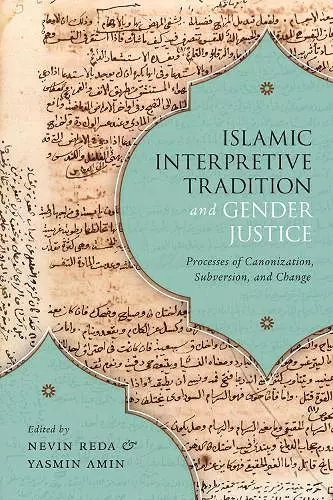Islamic Interpretive Tradition and Gender Justice
Processes of Canonization, Subversion, and Change
Nevin Reda editor Yasmin Amin editor
Format:Hardback
Publisher:McGill-Queen's University Press
Published:10th Dec '20
Currently unavailable, and unfortunately no date known when it will be back
This hardback is available in another edition too:
- Paperback£32.00(9780228001638)

A timely critique of the entrenchment of tradition in Islam, with solutions to recover the religion's dynamism.
Since the 1980s, Muslim women reformers have made great strides in critiquing and reinterpreting the Islamic tradition. Yet these achievements have not produced a significant shift in the lived experience of Islam, particularly with respect to equality and justice in Muslim families. A new approach is needed: one that examines the underlying instruments of tradition and explores avenues for effecting change. In Islamic Interpretive Tradition and Gender Justice leading intellectuals and emerging researchers grapple with the problem of entrenched positions within Islam that affect women, investigating the processes by which interpretations become authoritative, the theoretical foundations upon which they stand, and the ways they have been used to inscribe and enforce gender limitations. Together, they argue that the Islamic interpretive tradition displays all the trappings of canonical texts, canonical figures, and canon law – despite the fact that Islam does not ordain religious authorities who could sanction processes of canonization. Through this lens, the essays in this collection offer insights into key issues in Islamic feminist scholarship, ranging from interreligious love, child marriage, polygamy, and divorce to stoning, segregation, seclusion, and gender hierarchies. Rooting their analysis in the primary texts and historical literature of Islam, contributors to Islamic Interpretive Tradition and Gender Justice contest oppressive interpretative canons, subvert classical methodologies, and provide new directions in the ongoing project of revitalizing Islamic exegesis and its ethical and legal implications.
"Islamic Interpretive Tradition and Gender Justice offers many original and compelling insights into Qur'anic exegesis, Muslim laws, and Islamic traditions and is likely to open up new interpretive horizons for rethinking religious knowledge." Asma Barlas, Ithaca College and author of Believing Women in Islam: Unreading Patriarchal Interpretations of the Qur'an
ISBN: 9780228001621
Dimensions: unknown
Weight: 454g
424 pages